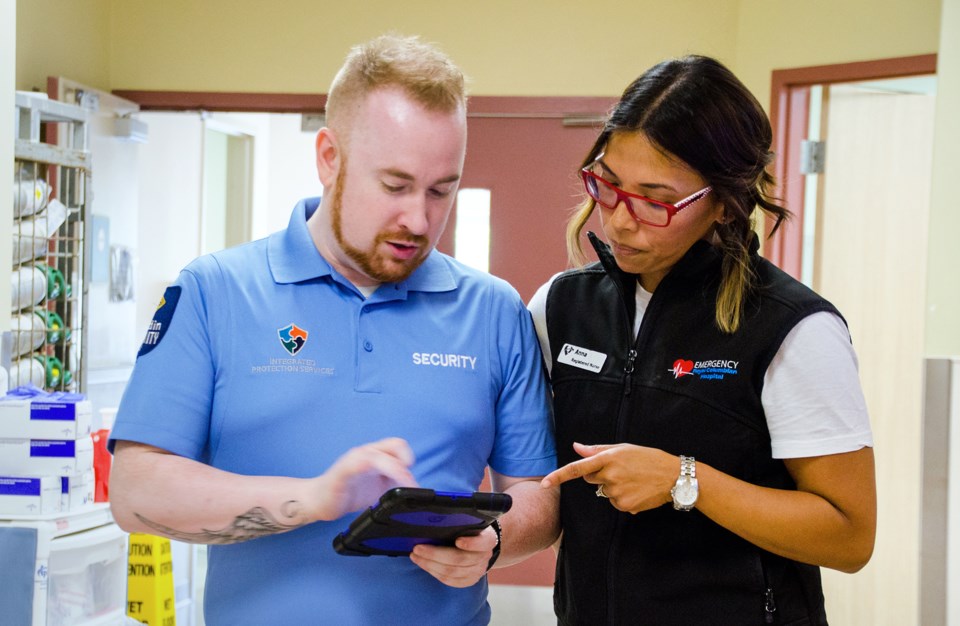With a steady rise in reported incidents of violence at big urban hospitals like Royal Columbian, security officials in the Fraser Health Authority could have decided to beef up uniformed security officers, arming them with batons and pepper spray.
Instead, they’ve decided to add their version of a Walmart greeter – and the move seems to be paying off.
Six months ago, a new breed of security guard, wearing Dockers and a blue golf shirt, began working the room at Royal Columbian’s emergency department during peak hours.
Called client care ambassadors, they are trained security officers, but their role in the ER is anything but heavy-handed.
“A lot of it is just client care, everything from bringing a glass of water to a warm blanket to just sitting at a person’s bedside and just talking to them,” said RCH ambassador David Eden, who’s been on the job since November.
During his 11 a.m. to 11 p.m. shift, Eden said he circulates among patients and visitors in the ER, keeping an eye out for people who look out of sorts, who might be pacing, grumbling to themselves, clenching their jaws or raising their voices.
“If I can find some way of helping that person, that calms them down, and if they’re calm, then the staff is calm, the department is calm and the chances of violence drops dramatically,” Eden said.
Between 2013 and 2015, reported incidents of violence at RCH more than doubled, jumping from 43 to 98.
The client care ambassador program, originally piloted at St. Paul’s in Vancouver before being extended to RCH and Surrey Memorial, is designed to cut into that number by anticipating the needs of distraught and aggressive ER patients and visitors before they become violent.
The initiative seems to be making a difference.
Six months after the RCH program was put in place, physical aggression in the ER was down by 39 per cent, verbal aggression was down by 13 per cent and the ER staff’s feelings of safety and security went from an average of 5.1 to 7.4 on a 10-point scale.
According to data tracked on iPads during their shifts over that time, RCH client care ambassadors de-escalated 443 incidents where they observed some type of aggression.
“Potentially, those 443 could have turned into higher-level aggression, up into physical aggression,” Jeff Young, executive director of integrated protection services, told the Record.
Because the ambassador job is new and doesn’t supplant a regular security guard position, ambassadors can focus on building rapport with patients and families and leave “hands-on” interventions to their uniformed counterparts.
But avoiding physical encounters isn’t always possible.
“I’ve had calls where four or five New West PD officers come in with a single person that they’ve apprehended, and my job is to make sure that transition from police to hospital is as smooth as possible,” Eden said. “It’s not always successful. If these people are up on drugs or alcohol, then sometimes there’s not much I can do, but it doesn’t mean that I can’t try.”
The client care ambassador program recently earned a Golden Apple award in the workplace health innovation category at the 10th annual B.C. Health Care Awards.
It’s rewarding work, according to Eden, who was a regular hospital security guard for integrated protection services contract provider, Paladin Security, before he applied for the ambassador job.
For him, the most rewarding moment on the job so far didn’t even have much to do with de-escalating violence.
A man in his 60s had spent days alone in a room just off the emergency department sitting by the bedside of his dying wife.
Eden and a social worker worked together to secure him a recliner.
“It was just him and her, very much alone,” Eden said of the man.
The man came back to thank Eden for being there for him in his time of need.
“It was quite a touching moment,” Eden said. “The fact that we get to know these people, both staff and visitors and patients on a very personal level is one of the most rewarding things I’ve ever experienced in my life.”



